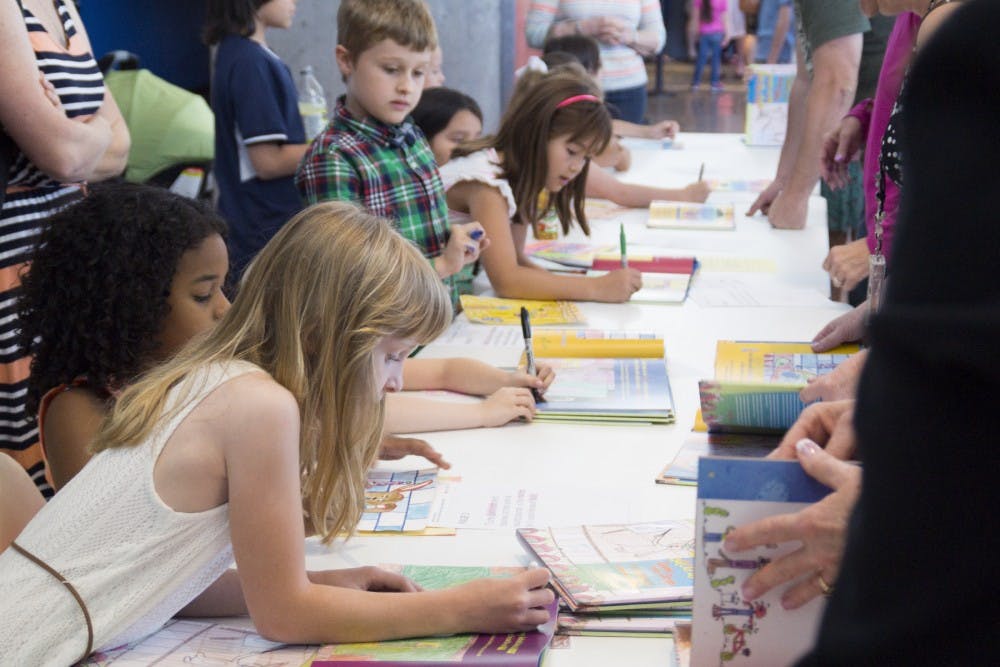Jeremy Jackrabbit is the name of a locally created children’s book series, written by Phoenix attorneys Rodney and Sasha Glassman. The series emphasizes sustainability efforts and environmental education and works to teach children about rainwater harvesting, recycling, harnessing sun rays and more.
The series, which depicts Jeremy Jackrabbit’s efforts to live a more sustainable life, exhibits ASU’s efforts to leave a small environmental footprint. It is because of this that the Jeremy Jackrabbit series and ASU maintain a strong partnership. The ASU Foundation helped fund the book's publication.
“The ASU Foundation is the fiduciary for the children’s book project, meaning that as we raise the $100,000 required per title, they hold the money until it is time to print and bind the books,” said Rodney Glassman, author and candidate for Arizona Corporation Commission. “President Crow generously writes the forewords for each book, and the Global Institute of Sustainability writes hands-on lesson plans themed for the story which align to state academic standards for teachers to download (from our website).”
Once again, ASU proves its dedication to sustainability and environmental protection by extending its resources to off-campus educational efforts. The University, and President Crow specifically, demonstrate a commitment to supporting the local community by partnering with this series and enabling thousands of children to learn about sustainability, for free.
“When I was elected to the Tucson City Council while in law school, I championed the nation’s first rainwater harvesting ordinance for commercial development, graywater plumbing ordinance for new homes, and solar power heating for new homes,” Glassman said. “The idea of a children’s book that taught kids about the importance of natural resources and a project that would provide free books to thousands of kids in Arizona was our vision.”
Since the release of the first book, hundreds of thousands of free copies have been donated to schools and libraries across Arizona. This allows thousands of children, specifically those located in Maricopa County, to gain access to environmental education.
“Many children in Arizona do not have books at home,” Glassman said. “Having distributed over 250,000 free books, we are promoting literacy and sustainability and engagement.”
Learning the importance of recycling and rain harvesting at a young age can help produce more sustainable leaders in the future. ASU hopes to teach all people the value of conservation, even if they do not attend the university.
While the series contains one branded Jeremy Jackrabbit and consistent font, the bulk of the book is incredibly unique. Each page is drawn by a different Arizona student and includes a Spanish translation of each section. This way, a wider variety of Arizona students are able to learn about environmental cleanliness and preservation.
For their second book, Sasha and Rodney accepted drawings from dozens of children across Maricopa County schools. The authors wanted students to be apart of the creation of the series, so they enabled them to be the illustrators. The central depiction of Jeremy Jackrabbit serves as the face of the series, but the students’ version fills every other page.
Teaching young children about these efforts also prepares them for a future at ASU. Since ASU is a sustainable campus, and is always looking for ways to promote energy conservation and environmental protection, children who learn the significance of this at a young age will have a better understanding of ASU’s mission in the future.
Efforts to make a community more sustainable don't always have to be as heavy-handed as installing a solar panel or turning off sprinklers during warmer months. More subtle initiatives like these, which help instill a sense of environmental responsibility are important.
The fact the University is helping these efforts reflects the desire to make lasting change.
Reach the columnist at amsnyde6@asu.edu or follow @AnnieSnyder718 on Twitter.
Editor’s note: The opinions presented in this column are the author’s and do not imply any endorsement from The State Press or its editors.
Want to join the conversation? Send an email to opiniondesk.statepress@gmail.com. Keep letters under 500 words and be sure to include your university affiliation. Anonymity will not be granted.
Like The State Press on Facebook and follow @statepress on Twitter.




